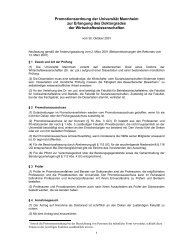The returns to cognitive and non-cognitive abilities in Germany
The returns to cognitive and non-cognitive abilities in Germany
The returns to cognitive and non-cognitive abilities in Germany
You also want an ePaper? Increase the reach of your titles
YUMPU automatically turns print PDFs into web optimized ePapers that Google loves.
et al., 2009) us<strong>in</strong>g German data. In addition <strong>to</strong> these studies, our paper provides the first jo<strong>in</strong>t<br />
evidence on the relationship between <strong>cognitive</strong> <strong>abilities</strong>, personality <strong>and</strong> earn<strong>in</strong>gs <strong>in</strong><br />
<strong>Germany</strong>. Account<strong>in</strong>g for both <strong>in</strong>telligence <strong>and</strong> personality is important, s<strong>in</strong>ce they have<br />
been shown <strong>to</strong> be related <strong>to</strong> each other (e.g., Sternberg <strong>and</strong> Ruzgis, 1994; Furnham et al.,<br />
1998). Until now, the impact of both <strong>cognitive</strong> <strong>and</strong> <strong>non</strong>-<strong>cognitive</strong> skills on labor market<br />
outcomes has been addressed only by a few studies on the UK <strong>and</strong> ma<strong>in</strong>ly the US (Osborne<br />
Groves, 2005; Heckman, et al., 2006; Mueller <strong>and</strong> Plug, 2006, Cebi 2007). In addition <strong>to</strong><br />
previous analyses, which are based on only one or few dimensions of personality, our study<br />
uses a greater variety of personality measures. We are therefore able <strong>to</strong> directly compare<br />
different personality <strong>in</strong>dica<strong>to</strong>rs which have been analyzed only separately until now.<br />
Moreover, complement<strong>in</strong>g prior research on the UK <strong>and</strong> the US, our study exam<strong>in</strong>es whether<br />
the l<strong>in</strong>k between cognition, personality <strong>and</strong> labor market success can be found also <strong>in</strong><br />
<strong>Germany</strong>, which has a more regulated labor market <strong>and</strong> a less meri<strong>to</strong>cratic society. It might<br />
moreover be the case that the ma<strong>in</strong>ly free access <strong>to</strong> school<strong>in</strong>g (at no or very low cost) <strong>in</strong><br />
<strong>Germany</strong> has other implications for the <strong>returns</strong> <strong>to</strong> <strong>cognitive</strong> <strong>and</strong> <strong>non</strong>-<strong>cognitive</strong> skills relative<br />
<strong>to</strong> the <strong>returns</strong> <strong>to</strong> education than <strong>in</strong> anglo-saxon countries.<br />
2. Background, previous f<strong>in</strong>d<strong>in</strong>gs <strong>and</strong> expectations<br />
Conceptual considerations<br />
A gradient between <strong>in</strong>dividuals’ <strong>cognitive</strong> <strong>abilities</strong> <strong>and</strong> their behavior on the job may<br />
be expected s<strong>in</strong>ce it is plausible <strong>to</strong> assume that <strong>in</strong>dividuals with higher <strong>cognitive</strong> <strong>abilities</strong> are<br />
able <strong>to</strong> process new <strong>in</strong>formation more quickly. <strong>The</strong>y may likewise be expected <strong>to</strong> perform<br />
better if challenged with more complex tasks than <strong>in</strong>dividuals with fewer <strong>cognitive</strong> skills.<br />
<strong>The</strong> exist<strong>in</strong>g evidence on the impact of <strong>cognitive</strong> skills on labor market success however is<br />
4















